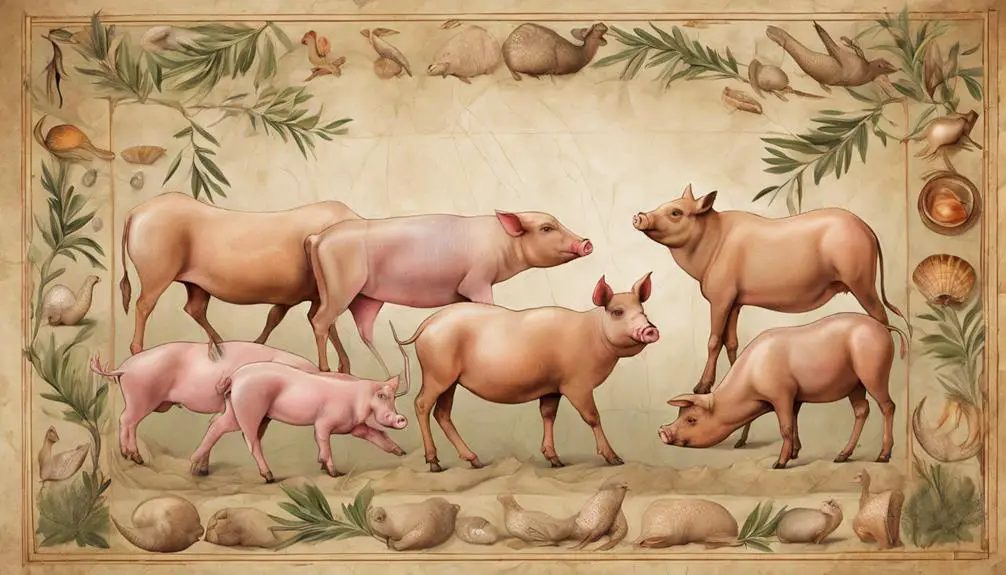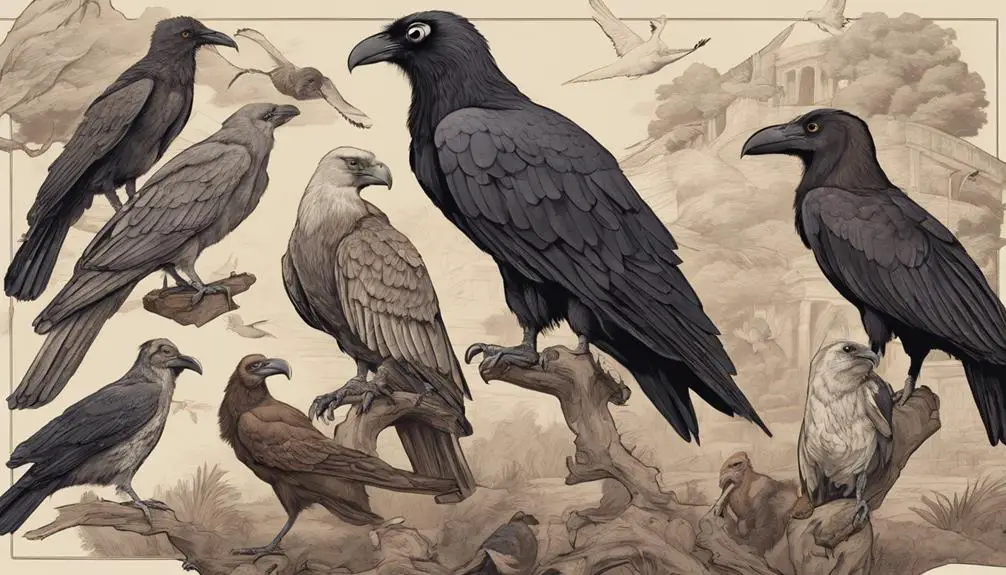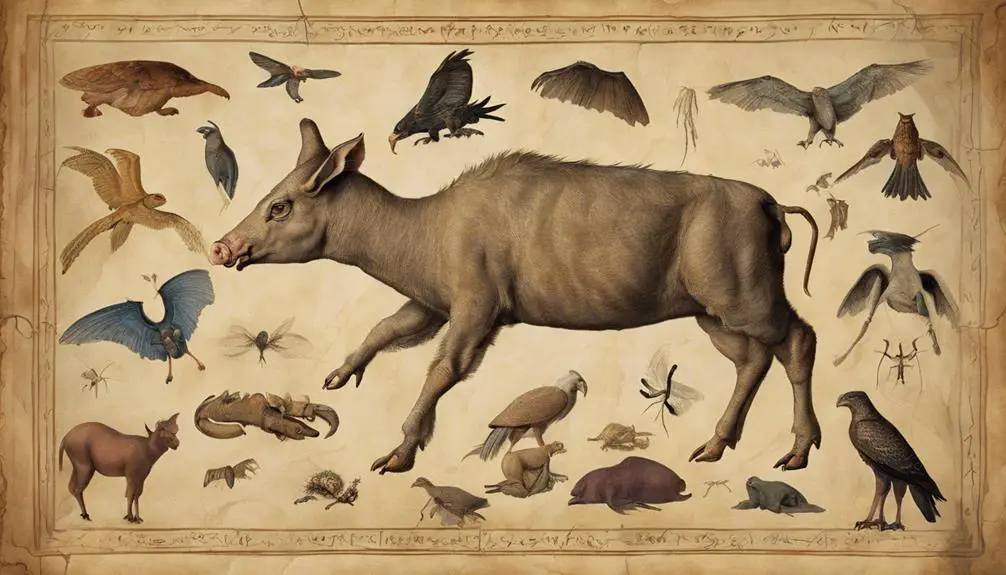Discover the surprising list of unclean animals in the Bible and uncover the ancient wisdom behind these dietary laws.

List of Unclean Animals in the Bible
Navigating the biblical waters of dietary laws is no small feat, especially when it comes to the list of unclean animals. You might find yourself surprised by what's considered off-limits, from the well-known prohibition of pork to the less familiar bans on certain sea creatures, birds, insects, and reptiles.
These ancient guidelines not only shaped the dietary habits of past civilizations but continue to influence modern practices and beliefs. As you explore this topic, you'll uncover the reasons behind these prohibitions and how they reflect the cultural, religious, and health concerns of the times.
This journey promises to shed light on a fascinating aspect of biblical history, leaving you with a deeper understanding of its lasting impact.
Key Takeaways
- The Bible prohibits the consumption of pork, shellfish, certain birds, insects, and reptiles due to health and purity laws.
- Dietary restrictions serve as a marker of religious and cultural identity, reflecting deep-rooted scriptural teachings.
- Forbidden animals include eagles, vultures, owls, hawks, eels, cephalopods, crustaceans, and specific insects and reptiles.
- These laws not only aim to ensure physical health but also reinforce spiritual and communal boundaries.
The Prohibition of Pork

The prohibition of pork, a dietary law deeply rooted in biblical scripture, reflects a complex interplay of cultural, religious, and historical factors. You'll find that this ban isn't merely a random decree but is imbued with profound cultural significance and potential health implications. Historically, communities adhering to these dietary laws have viewed the avoidance of pork as a marker of identity, setting them apart within a mosaic of ancient societies. This distinction isn't trivial; it's woven into the fabric of their cultural and spiritual life, reinforcing a sense of belonging and commitment to a collective ethos.
Moreover, the health implications of consuming pork have been a topic of discussion for centuries. In the context of ancient food preservation and cooking methods, the ban on pork could have served as a protective health measure against diseases associated with undercooked meat and poor hygiene practices. Thus, the prohibition isn't only a testament to the enduring influence of religious texts on dietary habits but also possibly reflects an intuitive understanding of food safety principles in a time before modern science could explain the risks.
Forbidden Sea Creatures

Biblical texts also delineate a variety of sea creatures that adherents are forbidden to consume, setting specific criteria for what's considered clean or unclean in aquatic life. These restrictions, deeply embedded within religious doctrines, carry both cultural significance and potential health implications. Analyzing these prohibitions reveals an intersection of faith, dietary habits, and ancient wisdom.
In the context of forbidden sea creatures, the Bible specifies that only those with fins and scales are considered clean. This directive excludes a vast array of marine life from consumption:
- Shellfish, including shrimp, crabs, and lobsters
- Various types of eels
- Cephalopods, such as octopuses and squids
- All types of crustaceans
The exclusion of these creatures from the diet of adherents isn't arbitrary. From an analytical perspective, these rules can be seen as precautionary measures against the consumption of potentially harmful or toxic species. Furthermore, the distinction between clean and unclean sea creatures plays a significant role in shaping the dietary laws and cultural practices of communities, underscoring the intertwined nature of religious beliefs and health practices.
Unclean Birds Detailed

In exploring the dietary restrictions outlined in religious texts, it's crucial to examine the specific birds deemed unclean and prohibited for consumption, reflecting on the underlying reasons and impacts of these injunctions. The classification of certain birds as unclean is not arbitrary; it often reflects broader concerns about dietary health and the symbolic meanings attached to these creatures.
Birds Deemed Unclean |
Significance |
|---|---|
Eagles |
Symbolizes power but considered scavengers, potentially linking to health risks. |
Vultures |
Associated with death and decay, reflecting dietary health concerns. |
Owls |
Represents wisdom in some cultures, yet categorized as unclean, possibly due to diet or nocturnal nature. |
Hawks |
Symbolic of freedom and strength, yet their predatory behavior may raise health concerns. |
This table illustrates the complex interplay between the symbolic representations of certain birds and the practical considerations of dietary health. By prohibiting the consumption of these birds, religious texts implicitly guide followers towards choices deemed safer or more spiritually aligned with their values. Understanding these restrictions requires a nuanced appreciation of both the symbolic significance of these birds and the historical context regarding dietary health.
Banned Insects and Reptiles

Moving beyond avian prohibitions, our focus shifts to the realm of insects and reptiles, which also play a significant role in religious dietary laws. The Bible outlines specific insects and reptiles that are considered unclean and thus prohibited for consumption. This designation not only reflects religious purity but also carries health implications and underscores cultural significance.
Analyzing the biblical texts, several reasons emerge for these prohibitions:
- Health Implications: Many of the banned insects and reptiles are known to carry diseases or toxins that can be harmful to humans if ingested.
- Cultural Significance: The designation of certain animals as unclean can serve to reinforce group identity and adherence to religious norms.
- Dietary Regulations: These restrictions help to regulate the diet of adherents, potentially promoting a form of discipline and mindfulness about food consumption.
- Historical Context: The prohibitions must be understood within the historical context in which they were written, reflecting the environmental and societal conditions of the time.
Understanding these prohibitions requires a nuanced approach that considers the complex interplay between religious doctrine, health concerns, cultural practices, and historical circumstances.
Other Prohibited Animals

Delving deeper into the dietary laws prescribed in sacred texts, we encounter a diverse range of animals beyond insects and reptiles that are also deemed unclean and prohibited for consumption. This prohibition extends to certain mammals, birds, and even aquatic creatures, each classified according to specific criteria outlined in the scriptures. The rationale behind these prohibitions isn't merely hygienic or dietary but is deeply rooted in dietary symbolism and cultural influences.
The dietary laws serve as a physical manifestation of the spiritual and ethical teachings of the faith. They symbolize purity, discipline, and the distinction between the sacred and the profane. The selection of prohibited animals isn't arbitrary but reflects a complex interplay of historical, environmental, and societal factors. For instance, certain animals were associated with idolatry or were considered symbols of chaos and uncleanliness in the surrounding cultures.
Understanding the list of unclean animals requires a comprehension of the broader context in which these laws were given. It's essential to appreciate how cultural influences shaped these dietary prescriptions and how they, in turn, reinforced a collective identity among the faithful. The dietary laws, including the prohibition of specific animals, thus serve as a tangible expression of faith, cultural identity, and communal boundaries.
Frequently Asked Questions
How Does the Concept of 'Unclean Animals' in the Bible Relate to Modern Dietary Laws in Various Religions?
The concept of 'unclean animals' significantly influences modern dietary laws across various religions, guiding ethical consumption. You'll find that these ancient guidelines have evolved into complex dietary rules reflecting not only religious obedience but also ethical and health considerations.
Cross-cultural comparisons reveal a fascinating blend of ancient religious texts and contemporary values, showing how societies adapt historical religious practices to suit modern ethical and health-conscious lifestyles.
Are There Any Health-Related Reasons Behind the Classification of Certain Animals as Unclean in the Bible?
You might think the ancient classifications of unclean animals were plucked from thin air, but there's more to it. These designations often align with health concerns, such as microbial resistance, which can be higher in certain species. Moreover, cooking techniques at the time weren't advanced enough to eliminate all risks.
In this light, the categorization wasn't just a spiritual guideline but also a primitive form of dietary regulation, guarding against illness.
How Have Interpretations of What Constitutes an Unclean Animal Evolved Over Time Within Different Christian Denominations?
Over time, interpretations of what's considered an unclean animal have shifted among Christian denominations. Geographical adaptations and ecumenical dialogues have played pivotal roles in these changes.
You'll find that what's deemed unclean in one region mightn't be in another, reflecting local customs and ecological contexts. These discussions have also been influenced by broader theological debates, showing how religious understanding adapts to new insights and cross-cultural exchanges.
What Historical or Cultural Factors Influenced the Original List of Unclean Animals in the Bible?
You'll find that historical and cultural factors significantly influenced the original categorization of certain animals as unclean. Agricultural practices played a crucial role, as they determined the types of animals that were integral to societies' diets and economies.
Additionally, trade routes affected these classifications, introducing new animals and dietary laws influenced by interactions with neighboring cultures. These elements together shaped the dietary guidelines that have been passed down through generations.
How Do Vegetarians and Vegans View the Biblical Restrictions on Unclean Animals, and Do These Restrictions Impact Their Dietary Choices?
You might find that many vegetarians and vegans don't heavily weigh the biblical restrictions on unclean animals in their dietary choices. Instead, their decisions often stem from animal rights perspectives or environmental sustainability discussions.
While the Bible's views might be of interest, they typically prioritize ethical and ecological concerns over religious dietary laws, seeking to minimize harm to animals and reduce their environmental footprint rather than adhering to scriptural food prohibitions.
Conclusion
In conclusion, the biblical catalog of unclean animals, spanning from pork to certain sea creatures, birds, insects, and reptiles, serves a deeper purpose than mere dietary restriction.
Investigating the theory that these prohibitions were health-related, one finds evidence supporting this notion, particularly in the context of ancient food preservation and disease prevention techniques.
This scholarly analysis underscores the interconnectedness of religious mandates and practical health considerations, thus adding a layer of pragmatic wisdom to these ancient texts.



Sign up